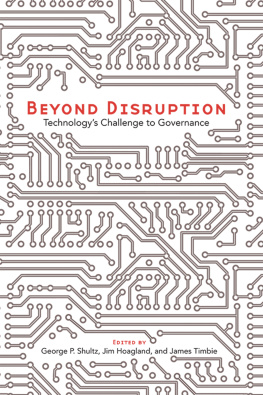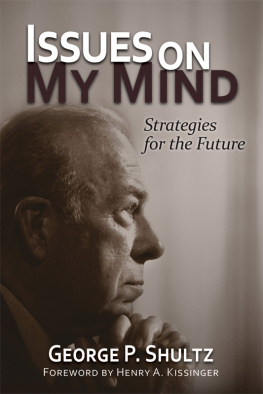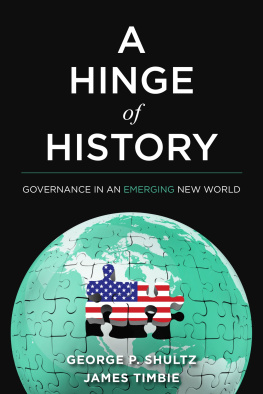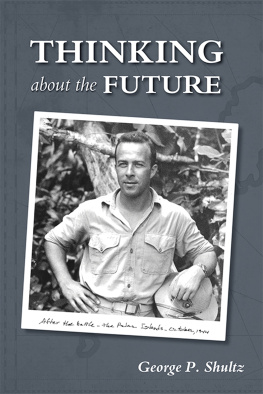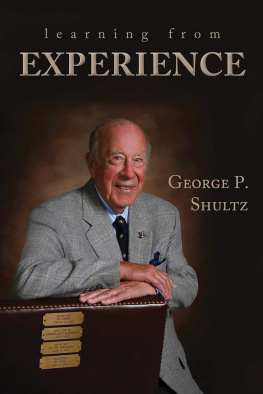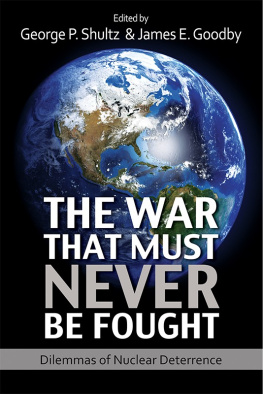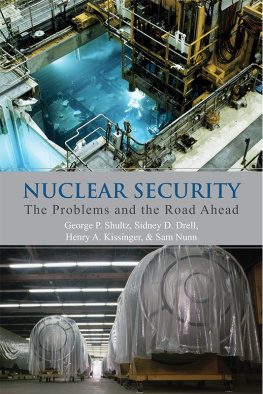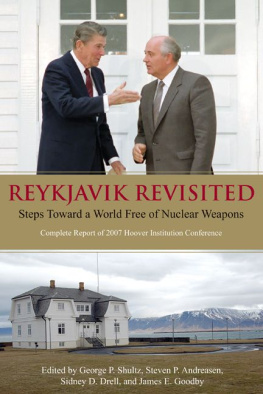Praise for
Beyond Disruption
Technological change has disrupted societies throughout history. During most of the worlds industrial revolutions, governments learned to adapt and mitigate disruptions. This book raises a serious question whether we will be able to successfully deal with the threat of cyberwarfare, autonomous weapons systems, robotics, artificial intelligence, climate change, and the information revolution undermining governance in the twenty-first century. George Shultz, Jim Hoagland, and James Timbie have assembled a remarkable series of commentaries that make clear there is a way to get Beyond Disruption in the twenty-first century.
Leon E. Panetta
Former US secretary of defense
In their book, Beyond Disruption: Technologys Challenge to Governance, George Shultz, Jim Hoagland, and James Timbie demonstrate their keen understanding of a century-old observation by Norwegian internationalist Christian Lange: Technology is a useful servant but a dangerous master. As modern technology advances at accelerating warp speeds, bringing dynamic improvements for the human condition, the authors predict potentially serious consequences that could threaten global stability unless they are recognized and addressed. Beyond Disruption is a must-read for those who want to peer into the future of advancing technology and its effect on governance.
James A. Baker III
Former US secretary of state
Were obviously surrounded by so much that is so new to so many of us: the unparalleled potential of AI; powerfully autonomous systems; increasingly rapid cycles of scientific discovery. But the real concern is: Are we taking full advantage of whats new in this world? What are the opportunities we see, and the ones we dont want to miss? Shultz and his contributors give us a much-needed road map, masterfully showing usin our businesses, in our military, and in the political sphereexactly where our institutions need to go to forge the best possible future for the most possible people.
Eric Schmidt
Former executive chairman, Alphabet Inc.
Beyond Disruption
Technologys Challenge to Governance
George P. Shultz, Jim Hoagland, and James Timbie
Editors
HOOVER INSTITUTION PRESS
Stanford University | Stanford, California
 With its eminent scholars and world-renowned library and archives, the Hoover Institution seeks to improve the human condition by advancing ideas that promote economic opportunity and prosperity, while securing and safeguarding peace for America and all mankind. The views expressed in its publications are entirely those of the authors and do not necessarily reflect the views of the staff, officers, or Board of Overseers of the Hoover Institution.
With its eminent scholars and world-renowned library and archives, the Hoover Institution seeks to improve the human condition by advancing ideas that promote economic opportunity and prosperity, while securing and safeguarding peace for America and all mankind. The views expressed in its publications are entirely those of the authors and do not necessarily reflect the views of the staff, officers, or Board of Overseers of the Hoover Institution.www.hoover.org
Hoover Institution Press Publication No. 688
Hoover Institution at Leland Stanford Junior University,
Stanford, California 94305-6003
Copyright 2018 by the Board of Trustees of the
Leland Stanford Junior University
All rights reserved. No part of this publication may be reproduced, stored in a retrieval system, or transmitted in any form or by any means, electronic, mechanical, photocopying, recording, or otherwise, without written permission of the publisher and copyright holders.
For permission to reuse material from Beyond Disruption: Technologys Challenge to Governance, ISBN 978-0-8179-2145-3, please access www.copyright.com or contact the Copyright Clearance Center, Inc. (CCC), 222 Rosewood Drive, Danvers, MA 01923, 978-750-8400. CCC is a not-for-profit organization that provides licenses and registration for a variety of uses.
Efforts have been made to locate the original sources, determine the current rights holders, and, if needed, obtain reproduction permissions. On verification of any such claims to rights in the articles reproduced in this book, any required corrections or clarifications will be made in subsequent printings/editions.
Cataloging-in-Publication Data is available from the Library of Congress.
ISBN: 978-0-8179-2145-3 (pbk. : alk. paper)
ISBN: 978-0-8179-2146-0 (epub)
ISBN: 978-0-8179-2147-7 (mobi)
ISBN: 978-0-8179-2148-4 (PDF)
CONTENTS
George P. Shultz
Jim Hoagland
James Timbie
T. X. Hammes
Raymond Jeanloz and Christopher Stubbs
James O. Ellis, Jr.
Lucy Shapiro and Harley McAdams
John B. Taylor
Niall Ferguson
William Drozdiak
Nicole Perlroth
David M. Kennedy
Charles Hill
James Timbie
T he contents of this book were discussed at a special conference on governance and technological change at Stanford Universitys Hoover Institution on September 2728, 2017. The conference was dedicated to our late Hoover Institution colleague Sid Drell, an eminent theoretical physicist who was universally admired.
Sid played an indirect but important role in the effort by President Ronald Reagan to bring about reductions in our nuclear arsenals. Key advisersPaul Nitze and Jim Timbie (my co-editor for this book)often talked about ideas attributed to Sid Drell. Sids Hoover office was a beehive of talkyes, about nuclear weapons issues and national security but also about a wide range of other subjects. Visitors such as his physics friends, Raymond Jeanloz (UCBerkeley) and Chris Stubbs (Harvard), pitched in. Their chapter appears in this book.
Sid was an outstanding physicist with a great mind. He also had a wonderful capacity for friendship. Often, Jim Mattis, who was a Hoover Fellow for three years or so before becoming US secretary of defense, would join our conversations. Jim consulted with Sid on material he was writing, and Jim soon came to admire and respect Sid as much as we all did. Jim was unable to attend the conference in Sids honor, but he wrote the following letter to be read during the proceedings:
There could be no finer inspiration for this conference than the man we called Sid.
Dr. Sidney Drell was a giant in voice, intellect, spirit and... laughter. His example of unbending ethics, rigorous intellect, and irrepressible joy was matched by his love of family, physics, music... and life itself. Although our formative experiences came from opposite sides of the earth, I could have searched the world yet nowhere could I have found a finer friend.
Sid Drell was concerned about the issues discussed at our conference, and he encouraged the idea of holding such a meeting at the Hoover Institution. So, in a very real sense, our conference was a reflection of Sids wisdom. That wisdom will continue to be present as we ask ourselveswhen confronted with problems of various kindswhat kind of advice Sid would have given us.
George P. Shultz
Jim Hoagland
S ince early humans created the first stone tools, technology has brought great benefits accompanied by significant disruption and peril for its inventors and society. The first decades of the twenty-first century have brought a surfeit of such advantage and challenge.
But this time, technological change is both ubiquitousarriving nearly simultaneously in all parts of the globeand immediate, shrinking time as well as space. Decision-making, the hallmark of governance, is being severely disrupted. So are the political systems and industrial workplaces of the worlds democracies. The goal of this book, and of the conference at the Hoover Institution that gave rise to it, is to examine a still unfolding era of technological change that is unprecedented in scope, pace, and effect.
 With its eminent scholars and world-renowned library and archives, the Hoover Institution seeks to improve the human condition by advancing ideas that promote economic opportunity and prosperity, while securing and safeguarding peace for America and all mankind. The views expressed in its publications are entirely those of the authors and do not necessarily reflect the views of the staff, officers, or Board of Overseers of the Hoover Institution.
With its eminent scholars and world-renowned library and archives, the Hoover Institution seeks to improve the human condition by advancing ideas that promote economic opportunity and prosperity, while securing and safeguarding peace for America and all mankind. The views expressed in its publications are entirely those of the authors and do not necessarily reflect the views of the staff, officers, or Board of Overseers of the Hoover Institution.
